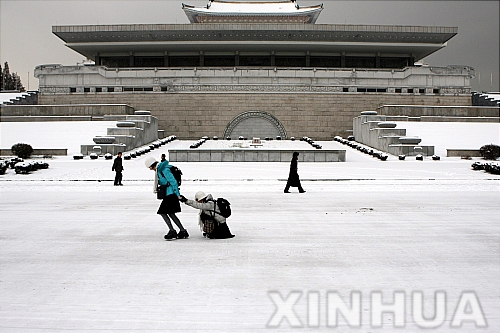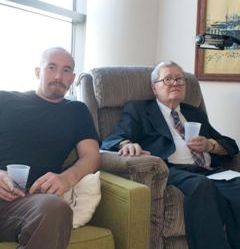The author is not privy to the great secrets of the assorted intelligence services that are trying to penetrate the mysteries of Pyongyang palaces. That said, one cannot completely rule out a possibility that the Dear Leader’s most trusted doctor is actually on the United States Central Intelligence Agency’s payroll, or that a couple of senior North Korean generals report to Seoul on the recent decisions of Kim Jong-il’s inner circle.
Such high-level penetration is not completely impossible – but it is very, very unlikely. It seems that even the most cunning and successful intelligence services are faring very badly when it comes to cracking North Korean secrets. Things might be going relatively well as long as signal intelligence is concerned: satellites do miracles these days. However, satellites and signal interception and other technological gadgetry is good only when it comes to detecting hardware. No satellite or drone can tell much about human plans and intentions, or about the state of society, and this is where the real problems begin.
To start with, the North Korean state is deliberately designed to be a mystery for outsiders. No state is welcoming to foreign spooks, but most states limit their counter-intelligence efforts. After all, perfect secrecy, if achievable, is too expensive because it makes information exchange impossible and hinders economic life. The North seems to be unrestrained by these concerns. Pyongyang believes that total secrecy is the pre-condition of the regime’s survival, and clearly doesn’t worry too much about the economic efficiency of its system.
The major source of information about any country is its media. However, since the early 1960s the North Korean press ceased publishing economic statistics of any kind. All information about economic performance is a closely guarded state secret. Therefore, our knowledge of the state of the North Korean economy is largely based on guesswork.
Still, certain things are known quite well. For example, foreign trade statistics are easily deduced from the trade reports of countries which deal with North Korea. On the other hand, when it comes to even the most basic macroeconomic indicators, estimates vary greatly. North Korean per capita gross domestic product is believed to be somewhere between US$400 and US$2,000. Also, there are some topics which cannot be mentioned in official press or elsewhere, such as the existence of rationing or the need to apply for a permit before travelling outside the county.
North Korean watchers spend plenty of time perusing the Nodong Sinmun and Minju Choson, the two official North Korean dailies which are available overseas. Although boring and repetitive to the extreme – and full of endless eulogies to the ruling family – these newspapers sometimes indicate subtle changes in official policies and ideologies. Still, these are merely hints, and often too vague to be interpreted correctly or expediently.
More direct intelligence has come with great difficulty. The number of foreigners residing in North Korea remains very small. In the mid-1980s, there were some 600-700, over 60% of whom were Russians and Chinese. Today, foreigners remain closely watched and isolated. A foreigner cannot visit the private home of a North Korean even briefly – only institutions which are authorized to deal with foreigners can be visited. A short conversation on the street is possible, but it should not be for too long.
North Koreans allowed to visit “foreigners’ places” are carefully selected and know what not to talk about. Foreigners – even those with Asian features – stand out in North Korea and are carefully watched by a population trained to remain on guard against intrusions of perfidious aliens. Trips outside Pyongyang and a few designated areas remain strictly prohibited; when such a trip is authorized, a foreigner is always accompanied by minders.
The only group of foreigners to enjoy some freedom of movement in North Korea are Chinese – and these are often ethnic Koreans. Chinese authorities probably have the best information about the state of affairs inside North Korea, but their knowledge remains unknown to the outside world.
Despite all the difficulties, the world does know – or believes it knows – something about Pyongyang politics. Until recently, the major source of news and information about North Korea was Japan. This was largely determined by Japan’s some 600,000-strong ethnic Korean community.
Surprisingly, in the 1950s, most ethnic Koreans in Japan chose to side with Pyongyang and even technically became North Korean citizens. Their association, Chosen Soren, became a secretive state-within-the-state, a major source of money and intelligence for North Korean authorities. Leading members of Chosen Soren have always had privileged access to powerful figures in the Pyongyang hierarchy. Understandably, some information was leaked.
However, as a rule most Japanese reports on North Korean politics are well of the mark. In some cases “news” is planted by political interests, other times false reports are honest mistakes. It is even suspected that in some cases journalists have deliberately fabricated stories to increase sales of their papers.
One of the major changes in recent years is that the border between China and North Korea has become extremely porous. Since the mid-1990s, the Chinese border areas have been major windows into the North. There is also a large community of North Korean illegal migrants, whose numbers in the late 1990s probably reached 250,000. Now there are some 30,000-40,000.
Some of these migrants make good money smuggling; others are employed at Chinese construction sites and sweatshops. These migrants stay in touch with their families in the North and the spread of mobile phones has facilitated the instantaneous flow of information.
Such family ties are hardly akin to James Bond-style secrets, but they do transmit handy low-level information about regulations on market trade or rules concerning workers of local factories. Until some 10 years ago, even such basic information usually remained unknown to outsiders.
Some groups have made use of the situation to provide North Korean news to the world. Most prominent of these providers is the Buddhist charity group Good Friends whose staff is permanently stationed in the border cities, where they gather information from visiting North Koreans. The results are published in regular newsletters that are partially translated into English. These newsletters provide invaluable intelligence.
Among other groups using similar strategies, the DailyNK is an online newspaper specializing in North Korean news and has correspondents in the Chinese border cities of Dandong and Shenyang. Their reports are very useful in understanding North Korean society, but seldom deal with high-level politics.
Finally, there is a large and fast growing community of North Korean defectors in the South. In 2000, there were merely a thousand defectors, but today their numbers have reached 15,000. These emigrants are remarkably different from the defectors of Europe’s Cold War era. People who fled from the former Soviet bloc included intellectuals, journalists, scholars and writers. Most of the North Korean defectors were impoverished farmers in the northern provinces. Many fled their starving villages, spent a few years in China and then found their way to the prosperous South. Prominent defectors are few and far between.
Still, all defectors possess useful information concerning daily life in North Korean society. This understanding is the major improvement from one or two decades ago. Observers are aware of how North Koreans make money, what they eat and how much they pay for their groceries.
We should not forget, however, that our knowledge of North Korean politics remains limited. In some cases we know names, but those names are merely empty symbols, without much content. For example, there is much speculation about Kim’s successor. Will it be Chang Song-t’aek, Kim’s brother-in-law? Or will Kim Jong-il choose his firstborn son, Kim Jong-nam? Or perhaps his younger son, Kim Jong-chol? And what about the current ladyfriend of the Dear Leader, a certain Ms Kim Ok?
The fact is we know nothing about these people. We have no idea about their affiliations, their experiences, or their vision for North Korea’s future.



